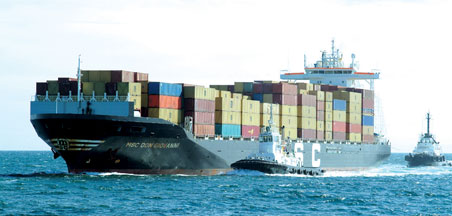Developing countries embrace new roles in shipping
Geneva- The globalization of maritime businesses allows shipping
companies to source from the most cost-efficient suppliers. This has led
to the reduction of international transport costs, which directly
benefits global merchandise trade, according to the latest UNCTAD Review
of Maritime Transport.
Maritime transport saw an increase in demand in 2010, in particular
in the dry bulk and container trade segments. Total seaborne trade
reached an estimated 8.4 billion tons.
 On the supply side, 2010 saw record deliveries of new tonnage, 28
percent higher than in 2009, resulting in an 8.6 percent growth in the
world merchant fleet. The fleet reached almost 1.4 billion deadweight
tons (DWT), in January of 2011, an increase of 120 million of DWT over
2010. New deliveries stood at 150 million DWT, against demolitions and
other withdrawals from a market of approximately 30 million DWT. On the supply side, 2010 saw record deliveries of new tonnage, 28
percent higher than in 2009, resulting in an 8.6 percent growth in the
world merchant fleet. The fleet reached almost 1.4 billion deadweight
tons (DWT), in January of 2011, an increase of 120 million of DWT over
2010. New deliveries stood at 150 million DWT, against demolitions and
other withdrawals from a market of approximately 30 million DWT.
Developing countries have made remarkable progress in international
seaborne transport - as documented for more than 40 years by UNCTAD's
annual Review of Maritime Transport (RMT). Developing countries'
shipping no longer consists solely of raw materials exports to the
developed world. Indeed the last decades have seen their increased
participation in global supply chains, which led to a surge in imports
of primary and intermediary products.
Between 1970 and 2010, developing countries' share in the volume of
seaborne imports rose from just 18 percent to 56 percent of the world's
total. The world's busiest container ports are Shanghai, Hong Kong
(China) and Singapore, and Asian developing
countries have the highest indicators of maritime transport
connectivity, as captured by UNCTAD's Liner Shipping Connectivity Index
(LSCI). But while the consolidation of the services provided by the
container shipping industry achieved improved operational efficiency, it
may also have entailed a loss in negotiating power for some players and
resulted in less overall market efficiency for smaller trading nations.
In July 2011, UNCTAD found that 35 coastal countries were served by
three or fewer liner companies, compared to 25 countries just five years
earlier.
The Report also highlights the entry into force, in September of
2011, of the International Convention on Arrest of Ships which was
developed under the auspices of UNCTAD, during the United Nations
International Maritime Organisation (IMO) high-level conference in 1999.
In the past decades, developing countries have substantially expanded
their fields of expertise to maritime sectors of greater business
sophistication and technical complexity. They first became major market
players in the provision of seafarers and
vessel registration, and are now expanding into practically all major
maritime sectors.
As highlighted in this year's special chapter of the UNCTAD Review of
Maritime Transport, developing countries are not only users of shipping
services but increasingly participants in the provision of these
services, through the operation of seaports, the construction of ships,
containers, and in the transport of equipment.
|

